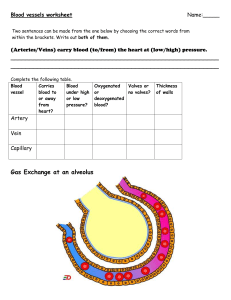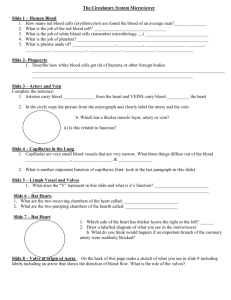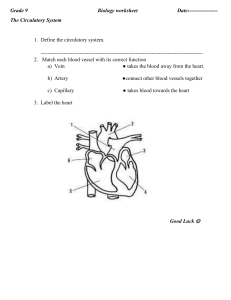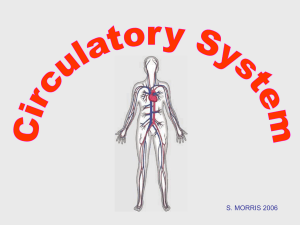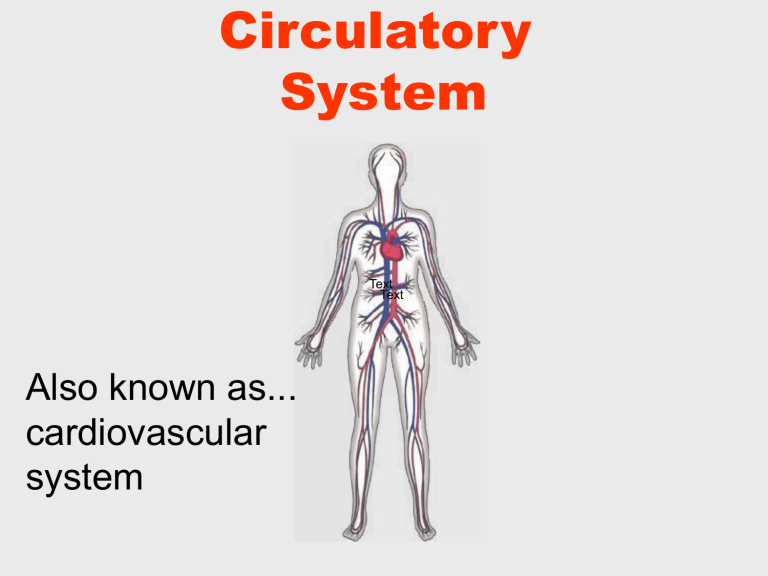
Circulatory System Text Text Also known as... cardiovascular system What is the circulatory system? The circulatory system carries blood and dissolved substances to and from different places in the body. The Heart has the job of pumping these things around the body. The Heart pumps blood and substances around the body in tubes called blood vessels. The Heart and blood vessels together make up the Circulatory System. How does this system work? pulmonary vein pulmonary artery lungs head & arms aorta main vein Right Left liver digestive system kidneys legs Circulatory System Our circulatory system is a double circulatory system. This means it has two parts parts. Lungs the right side of the the left side of the system system deals with deals with oxygenated blood. deoxygenated blood. Body cells The Heart The heart is a muscular organ, about the size of your fist, located between the lungs behind the sternum. It is a pump that beats an average of 72 times a minute, 100,000 times a day, and 3 trillion times an average lifetime. beating heart The Heart This is a vein. It brings blood from the body, except the lungs. These are arteries. They carry blood away from the heart. 2 atria Coronary arteries, the hearts own blood supply 2 ventricles The heart has four chambers now lets look inside the heart Chambers of the Heart the heart is divided into right and left sides by a wall called the septum the heart has four chambers: two upper, thin-walled atria, and two lower, thickwalled ventricles. Valves of the Heart Some valves control the flow of blood within the heart Mitral (bicuspid) valve: between the left atrium and left ventricle Tricuspid valve: between the right atrium and right ventricle The pulmonary and aortic valves stop the backflow of blood into the heart The Heart Artery to Lungs Vein from Head and Body Right Atrium valve Right Ventricle Artery to Head and Body Vein from Lungs Left Atrium valve Left Ventricle How does the Heart work? STEP ONE blood from the body blood from the lungs The heart beat begins when the heart muscles relax and blood flows into the atria. How does the Heart work? STEP TWO The atria then contract and the valves open to allow blood into the ventricles. How does the Heart work? STEP THREE The valves close to stop blood flowing backwards. The ventricles contract forcing the blood to leave the heart. At the same time, the atria are relaxing and once again filling with blood. The cycle then repeats itself. Passage of Blood Through Heart Each atria pumps blood to a ventricle through valves. (tricuspid and mitral valve) The right ventricle will pump blood to the lungs to be oxygenated (via: pulmonary artery) and the blood will return to the heart via the pulmonary vein. The oxygenated blood returns to the left atrium, then to the left ventricle and out through the aorta to the body. blood from the heart gets around the body through blood vessels There are 3 types of blood vessels a. ARTERY b. CAPILLARY c. VEIN Blood Flow Arteries (and arterioles) – carry blood away from the heart Capillaries – where nutrient and gas exchange occur Veins (and venules) – carry blood toward the heart. The ARTERY Arteries carry blood away from the heart. the elastic fibres allow the artery to stretch under pressure thick muscle and elastic fibres the thick muscle can contract to push the blood along. The VEIN Veins carry blood towards from the heart. veins have valves which act to stop the blood from going in the wrong direction. thin muscle and elastic fibres body muscles surround the veins so that when they contract to move the body, they also squeeze the veins and push the blood along the vessel. The CAPILLARY Capillaries link Arteries with Veins they exchange materials between the blood and other body cells. the wall of a capillary is only one cell thick The exchange of materials between the blood and the body can only occur through capillaries. Passage of Blood Through Heart Each atria pumps blood to a ventricle through valves. (tricuspid and mitral valve) The right ventricle will pump blood to the lungs to be oxygenated (via: pulmonary artery) and the blood will return to the heart via the pulmonary vein. The oxygenated blood returns to the left atrium, then to the left ventricle and out through the aorta to the body. The CAPILLARY A collection of capillaries is known as a capillary bed. artery body cell vein capillaries what’s in digested food red blood cells oxygen white blood cells BLOOD waste (urea) platelets carbon dioxide plasma hormones The Blood red blood cell platelets white blood cell plasma Red Blood Cells a biconcave disc that is round and flat without a nucleus contain hemoglobin, a molecule specially designed to hold oxygen and carry it to cells that need it. can change shape to an amazing extent, without breaking, as it squeezes single file through the capillaries. White Blood Cells there are many different types and all contain a big nucleus. the two main ones are the lymphocytes and the macrophages. macrophages ‘eat’ and digest microorganisms . some lymphocytes fight disease by making antibodies to destroy invaders by dissolving them. other lymphocytes make antitoxins to break down poisons. Platelets Platelets are bits of cell broken off larger cells. Platelets produce tiny fibrinogen fibres to form a net. This net traps other blood cells to form a blood clot. Plasma It also contains useful things like; • carbon dioxide A strawcoloured liquid that carries the cells and the platelets which help blood clot. • glucose • amino acids • proteins • minerals • vitamins • hormones • waste materials like urea. SUMMARY copy and complete the following; away from the heart. The walls of an artery Arteries take blood ______ muscular walls and elastic fibres. Veins carry are made up of thick _________ towards blood ________ the heart and also have valves. The _________ link capillaries arteries and veins, and have a one cell thick wall. Blood is made up of plasma four main things ______, the liquid part of the blood; Red Blood Cells oxygen to carry ______; White Blood cells to protect the body from disease platelets and _________ to help blood clot.
